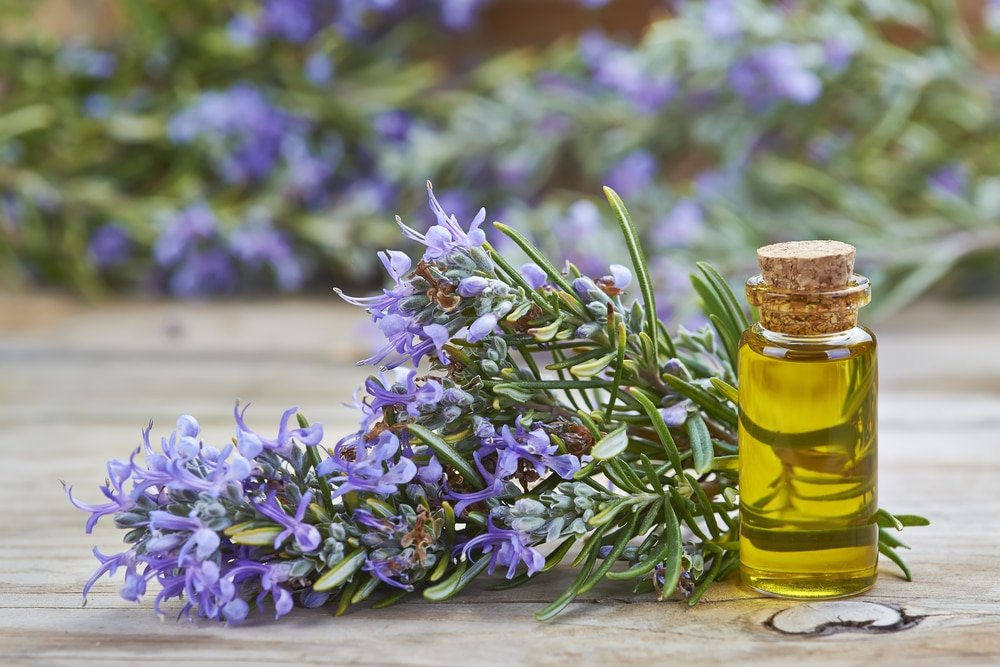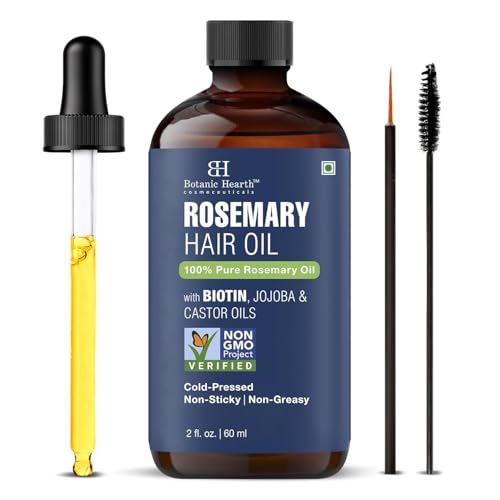Rosemary (Rosmarinus officinalis) is a fragrant herb commonly found in Mediterranean cuisine. While it’s widely known for its culinary uses, rosemary has a long history in traditional medicine due to its potent antioxidant, anti-inflammatory, and antimicrobial properties.
One of the most promising applications of rosemary oil, the essential oil extracted from the plant’s leaves, is in hair care—particularly for promoting hair growth and preventing hair loss. Many natural health enthusiasts and researchers are now exploring rosemary oil as an alternative to chemical-based hair treatments.
In this article, we’ll dive into the science behind rosemary oil, how it supports hair growth, and the best ways to use it for optimal results.
Understanding Hair Growth and Common Issues
To understand how rosemary oil promotes hair growth, it’s important to first understand the hair growth cycle and the common causes of hair loss.
The Hair Growth Cycle
Hair grows in a continuous cycle consisting of three phases:
- Anagen (Growth Phase): This is the active phase where hair grows about 1 cm per month. It can last from 2 to 7 years.
- Catagen (Transition Phase): A short phase (2–3 weeks) where hair stops growing, and the follicle begins to shrink.
- Telogen (Resting Phase): Hair remains in the follicle without growing for about 3 months before shedding to make room for new growth.
Disruptions in this cycle can lead to hair thinning or hair loss.
Common Hair Growth Issues
- Androgenetic Alopecia (Pattern Baldness): The most common cause of hair loss, affecting both men and women. It’s often linked to genetics and the hormone DHT (dihydrotestosterone), which shrinks hair follicles over time.
- Telogen Effluvium (Stress-Related Hair Loss): Triggered by physical or emotional stress, illness, or hormonal changes. It causes a large number of hairs to enter the telogen phase prematurely.
- Alopecia Areata: An autoimmune condition where the immune system attacks hair follicles, leading to patchy hair loss.
Understanding these conditions helps highlight how rosemary oil may play a role in stimulating hair growth and reducing hair loss.
Rosemary Oil: Composition and Properties

Rosemary oil is extracted from the plant’s leaves through a process called steam distillation. This method captures the plant’s aromatic compounds, which are rich in active ingredients beneficial for hair health.



Key Active Compounds in Rosemary Oil:
- Carnosic Acid: Known for its ability to repair damaged tissues and stimulate cellular regeneration, which can improve scalp health and promote hair growth.
- Rosmarinic Acid: A powerful antioxidant with anti-inflammatory properties, helping to soothe the scalp and protect hair follicles from oxidative stress.
- 1,8-Cineole (Eucalyptol): Enhances blood circulation, improving the delivery of oxygen and nutrients to hair follicles.
Properties Relevant to Hair Health:
- Antioxidant: Protects the scalp from free radical damage, which can weaken hair follicles.
- Anti-inflammatory: Reduces scalp inflammation, a common cause of hair thinning.
- Antimicrobial: Helps combat dandruff and scalp infections, creating a healthier environment for hair growth.
These properties make rosemary oil a versatile and effective natural remedy for hair growth and scalp health.
Mechanisms of Rosemary Oil in Promoting Hair Growth
Rosemary oil supports hair growth through several mechanisms, targeting both the scalp and the hair follicles.
1. Improves Scalp Circulation
Healthy hair growth depends on good blood flow to the scalp. Rosemary oil helps dilate blood vessels, increasing circulation to the hair follicles. This improved flow delivers more oxygen and nutrients, which are essential for hair follicle health and growth.
2. Inhibits DHT (Dihydrotestosterone)
DHT is a hormone linked to androgenetic alopecia (pattern baldness). It causes hair follicles to shrink, leading to thinner hair and eventually hair loss. Rosemary oil has been shown to block DHT activity, preventing follicle shrinkage and slowing hair loss.
3. Stimulates Hair Follicle Activity
By improving scalp health and increasing nutrient delivery, rosemary oil can reactivate dormant hair follicles and prolong the anagen phase, where hair actively grows. This leads to thicker, fuller hair over time.
Scientific Evidence Supporting Rosemary Oil for Hair Growth
2015 Study Comparing Rosemary Oil to Minoxidil
A landmark study published in Skinmed in 2015 compared the effects of rosemary oil and 2% minoxidil (a popular hair growth drug) on men with androgenetic alopecia.
- Participants: Men with pattern baldness were assigned to apply either rosemary oil or minoxidil twice daily for 6 months.
- Results: Both groups experienced significant increases in hair count after 6 months. Interestingly, rosemary oil performed just as well as minoxidil.
- Side Effects: Participants using rosemary oil reported less scalp itching compared to those using minoxidil, suggesting it’s better tolerated.
Additional Studies and Anecdotal Evidence
- Animal studies have shown that rosemary extract promotes hair regrowth after hormone-induced hair loss.
- Anecdotal evidence from users suggests noticeable improvements in hair thickness and reduced shedding after consistent use.
These findings highlight rosemary oil’s potential as an effective, natural alternative for hair growth.
How to Use Rosemary Oil for Hair Growth
Incorporating rosemary oil into your routine is simple. Here are some effective methods:
1. Direct Application (Scalp Massage)
- Dilution: Mix 5 drops of rosemary oil with 1 tablespoon of carrier oil (like coconut, jojoba, or olive oil).
- Massage: Apply the mixture to your scalp, massaging gently for 5–10 minutes to improve circulation.
- Leave On: Let it sit for at least 30 minutes or overnight, then wash with a mild shampoo.
2. Adding to Hair Products
- Add 5–10 drops of rosemary oil to your regular shampoo or conditioner.
- Use as part of your usual hair-washing routine to support scalp health.
3. Rosemary-Infused Hair Rinse
- Preparation: Steep fresh rosemary leaves in hot water for 15–20 minutes.
- Application: Let the mixture cool and use it as a final rinse after shampooing.
- This helps strengthen hair and reduce scalp irritation.
Recommended Frequency:
- For best results, use rosemary oil 2–3 times per week.
- Consistency is key—results may take 3–6 months to become noticeable.
Potential Side Effects and Precautions
While rosemary oil is generally safe, some people may experience mild side effects.
Potential Side Effects:
- Skin Irritation: Redness, itching, or rash if applied undiluted.
- Allergic Reactions: Rare, but can occur. Always perform a patch test before full application.
- Scalp Sensitivity: People with sensitive skin may experience tingling or burning sensations.
Precautions:
- Always dilute rosemary oil with a carrier oil before applying to the skin.
- Avoid contact with eyes and mucous membranes.
- Consult a doctor before use if you’re pregnant, breastfeeding, or have pre-existing skin conditions.
Alternative Natural Remedies for Hair Growth
If you’re exploring natural hair growth options, here are some alternatives to rosemary oil:
1. Peppermint Oil
- Benefits: Improves scalp circulation and promotes hair growth.
- Application: Similar to rosemary oil, diluted with a carrier oil.
2. Lavender Oil
- Benefits: Known for its calming properties and ability to stimulate hair follicles.
- Application: Can be mixed with rosemary oil for added benefits.
3. Saw Palmetto
- Benefits: An herbal supplement believed to block DHT, reducing hair loss.
- Application: Available in topical treatments and oral supplements.
While these remedies have shown potential, rosemary oil remains one of the most researched natural treatments for hair growth.
Conclusion
Rosemary oil offers a natural, effective solution for promoting hair growth, reducing hair loss, and improving scalp health. Backed by scientific studies, it works by:
- Stimulating blood circulation to the scalp
- Inhibiting DHT, a hormone linked to hair loss
- Strengthening hair follicles and promoting thicker, healthier hair
Key Takeaways:
✔ Stimulates hair growth and reduces hair thinning
✔ Effective for conditions like androgenetic alopecia
✔ Works as well as minoxidil in studies, with fewer side effects
✔ Easy to incorporate into your hair care routine
While results may take 3–6 months of consistent use, rosemary oil is a safe, natural, and cost-effective option for healthier, fuller hair.
Before starting any new hair treatment, consider consulting with a healthcare professional, especially if you have underlying health conditions.



Join the 7‑Day “Better Gut” Plan
Pop in your email and we’ll send Lesson 1 + the printable list.







